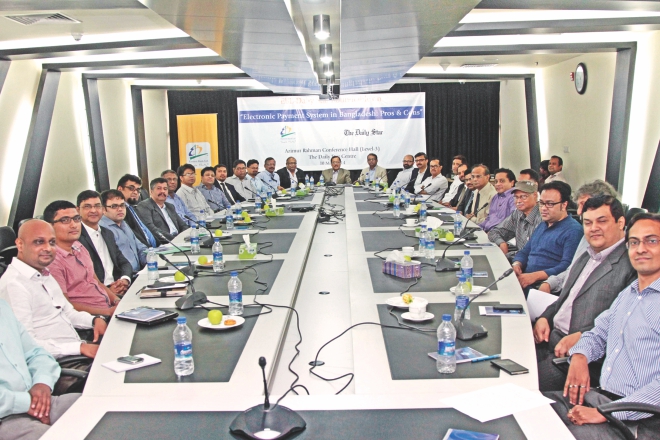Banks, telcos seek access to national ID database
Roundtable organised by EBL and The Daily Star focuses on e-payment
 Analysts attend a roundtable on the electronic payment system, organised by Eastern Bank and The Daily Star yesterday.
Analysts attend a roundtable on the electronic payment system, organised by Eastern Bank and The Daily Star yesterday.
Banks and telecom operators yesterday urged the government to immediately create an integrated platform enabling them to access the national identity database for checking the authenticity of information.
Mobile operators have to follow a similar process as banks when signing on new customers, so there is an urgent need to set up a common platform where the legitimacy of information, photograph and national identity card (NID) can be verified, Vivek Sood, chief executive of Grameenphone.
He went on to urge the central bank and Bangladesh Telecommunication Regulatory Commission to come up with a solution.
Sood's comments came at a roundtable on the pros and cons of electronic payment system in Bangladesh, co-organised by Eastern Bank and The Daily Star at The Daily Star Centre in Dhaka yesterday.
As per law, the Election Commission can share the NID database to only government agencies, said Debdulal Roy, deputy general manager of Bangladesh Bank, adding that the central bank is using the NID database for anti-money laundering and counter-terrorist financing.
Provided the Election Commission changes the law and gives permission to the central bank, BB will open a portal to share NID data with private banks and non-banking financial institution.
In that case, BB will behave like a service provider and not a regulator, Roy added.
Meanwhile, Sood called for wider use of the mobile banking platform. At present, it is only being used for cash in and cash out, when other services such as salary disbursement and utility bill payment can be done just as easily via mobile banking, he said.
“It is time to move to the next stage.”
Sood said the country holds great potential for mobile banking as there is no other way to transact if one goes to the rural areas.
Mobile banking, however, has some pitfalls, which Ali Reza Iftekhar, chief executive of Eastern Bank, pointed out.
At present, the formalities to get replacement SIM cards are lax. Anyone can walk in and get a replacement SIM card against a number, to which a mobile banking account may be registered. “It, therefore, poses threat to the mobile banking payment system.”
The EBL CEO urged the central bank to immediately come up with a robust dispute management policy for such cases of fraud.
“Actually, Bangladesh Bank is pushing us to go for national payment solutions without mentioning dispute and fraud management policy.”
In his speech, Iftekhar highlighted opportunities and challenges in e-payment: it opened new business avenues, but some risks such as cyber crimes and money laundering emerged as big threats to the system.
Syed Mohammad Kamal, country manager for Bangladesh of Mastercard, stressed the need for convergence of cards and mobile wallets for greater reach of financial services.
Acceptance capability of cards is still very low as there are around 8,500 merchants in the country, whereas the number of mobile banking agents stands at 260,000, he said.
“So it is the right time to have a proper eco-system between banks, cards and mobile operators. If we can do it, we can work for each other.”
Kamal also sees a lot of room for growth of card business in Bangladesh. Currently, the country has a total of around 40 million unique bank accounts but only seven million are debit cardholders and one million are credit cards.
Hassan Zaman, chief economist of BB, said the share of cash and e-payment is going up due to higher economic growth.
He said the central bank has its own interest in promoting e-commerce: BB spends around Tk 400 crore annually for printing notes.
While the practice of electronic fund transfer (Bangladesh Electronic Fund Transfer Network) is growing in the country, it is not growing at the expected rate due to lack of awareness, despite the system's full-proof security.
Zaman said the central bank is set to allow Paypal to operate in the country, important to foster international transaction.
Muhammad A Rumee Ali, chairman of bKash, a leading money transfer service provider, said the country will be a leader in mobile financial services within the next five years if the present growth trend continues.
He urged the regulators to hold constant dialogue with stakeholders for minimising frauds.
M Manjur Mahmud, director and chief operating officer of DataSoft, stressed the need for reducing the cost of transferring money from one place to another.
“The cost of sending money from place A to B in the country is still expensive. For instance, in Latvia, cost of sending money is less than one paisa.”
Kamal Quadir, chief executive of bKash, however claimed that the cost of sending money through mobile banking is one of the lowest in the world. He said bKash charges 1.8 percent of the total remitted amount.
Ershad Ahmed, general manager for regulatory affairs of Banglalink, highlighted the need for proper coordination between the central bank and BTRC for further development of mobile financial services.
Salehuddin Ahmed, managing editor of The Daily Star, called for greater awareness of mobile financial services.
Shahnoor Wahid, editor of The Daily Star's special supplements, also spoke in the session moderated by SA Chowdhury, former chairman of Bangladesh Krishi Bank and a former managing director of Sonali Bank.




Comments